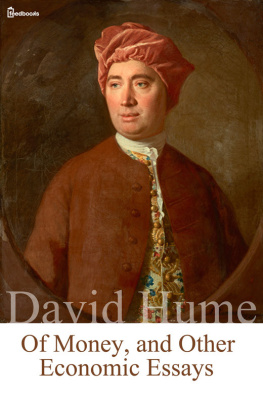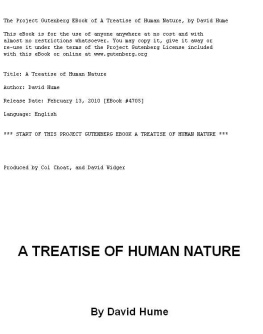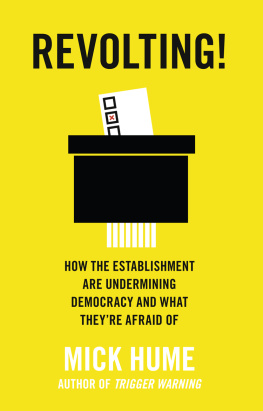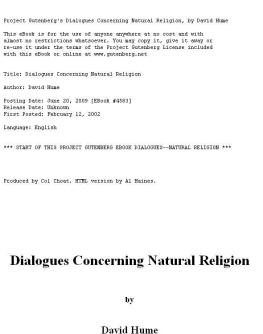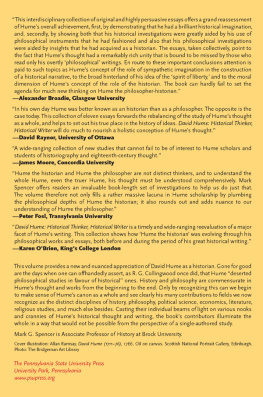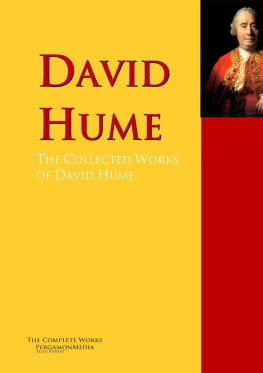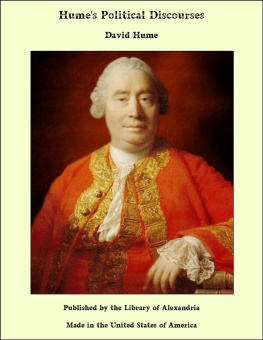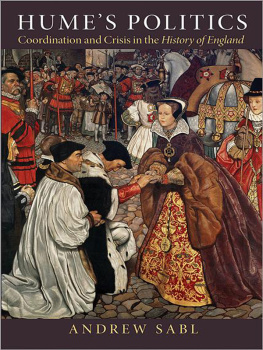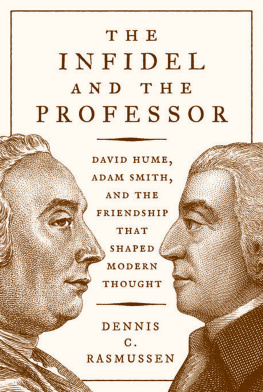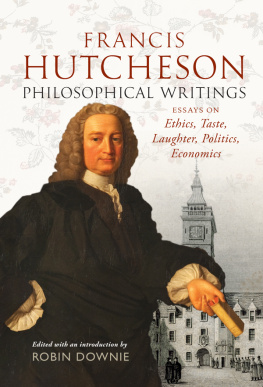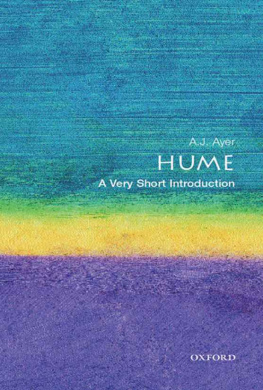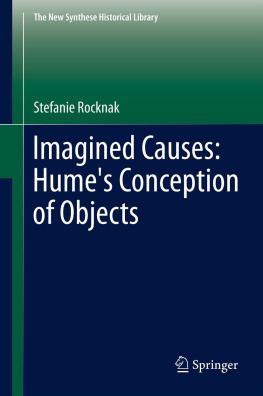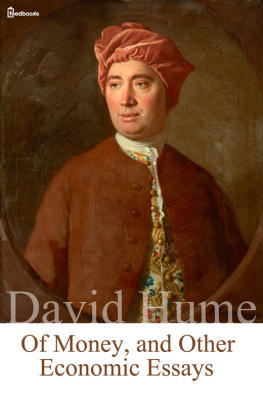About Hume:David Hume (17111776) was a Scottish philosopher, historian,economist, and essayist, known especially for his philosophicalempiricism and scepticism. He was one of the most important figuresin the history of Western philosophy and the ScottishEnlightenment. Hume is often grouped with John Locke, GeorgeBerkeley, and a handful of others as a British Empiricist. Hechanged the spelling of his name from the Scottish "Home" in 1734,because "Home" was pronounced as the English pronounced "Hume",which was not known in England. Hume attended the University ofEdinburgh at the unusually early age of twelve (possibly as youngas ten) at a time when fourteen was normal. At first he considereda career in law, but came to have, in his words, "an insurmountableaversion to everything but the pursuits of Philosophy and generalLearning; and while [my family] fanceyed I was poring over Voet andVinnius, Cicero and Virgil were the Authors which I was secretlydevouring." He had little respect for the professors of his time,telling a friend in 1735, "there is nothing to be learnt from aProfessor, which is not to be met with in Books." He foundemployment at various times as a merchant's clerk and as a tutor,while continuing to study philosophy and write his works, the firstof which, A Treatise of Human Nature, he completed at age26. It was not well received by critics in Great Britain. In 1744Hume applied for the Chair of Pneumatics and Moral Philosophy atthe University of Edinburgh. However, the position was given tosomeone else after Edinburgh ministers petitioned the town councilnot to appoint Hume because he was seen as an atheist. Later, Humewas charged with heresy, but he was defended by his young clericalfriends, who argued that as an atheist he was outside theChurch's jurisdiction. Despite his acquittal, Hume failed to gainthe chair of philosophy at the University of Glasgow. Hume wrote onthe subjects of philosophy (especially on epistemology how oneknows something to be true), religion, history, and politics.Through his discussions on politics, Hume developed many ideas thatare prevalent in the field of economics today. This includes ideason private property, inflation, and foreign trade. Referring toHume's essay "Of the Balance of Trade," Paul Krugman (aNobel-prize-winning economist) has remarked " David Hume createdwhat I consider the first true economic model." (Reference:Wikipedia)
Also available on FeedbooksHume:- DialoguesConcerning Natural Religion (1779)
Note: This book is brought toyou by Feedbooks
http://www.feedbooks.com
Strictly for personal use, do not use this file for commercialpurposes.
Preface to the Feedbooks Edition.
DAVID HUME is known for his philosophical writings, but he alsowrote on politics, history, and economics. This eBook contains 7economic essays which were first published in Hume's PoliticalDiscourses (1752) and again in Essays and Treatiseson Several Subjects, Volume 1 (1777). One essay hasbeen praised by the Nobel-Prize-winning economist, Paul Krugman,who said in his newspaper column:
" Hume also helped found economics: his 'Of the Balance ofTrade', published 34 years before The Wealth ofNations, was arguably the first example of modern economicreasoning, based on what amounts to a stylized model, albeit onewithout any equations or diagrams." (New York Times, 8 May2011, "Hume Day".)
"You could argue that modern economics really began with DavidHumes 'Of the Balance of Trade', whose core is a gloriously clearthought experiment ." (ibid., 2 Feb 2011, "Models, Plainand Fancy".)
Adam Smith, the author of The Wealth of Nations(1776), is commonly considered the "father of modern economics",but Hume pre-dated Smith in that regard. Both were Scottishphilosophers of the Scottish Enlightenment, and although Hume was adecade older than Smith, they became lifelong friends after theymet in 1750.
These essays cover Commerce, Money, Interest, Balance of Trade,Jealousy of Trade, Taxes, and Pubic Credit. Hume explained economicphenomena that we observe even today, such as the eventualself-correction of job migration to lower cost countries, moneysupply issues, the undesirable results of tariffs, military buildupin underdeveloped countries, the relationship between wages andlabor supply, and other topics that give insights into thehappenings we read about in the news almost daily.
Editorial Note.
The chapters of this eBook were extracted from Hume's collectiontitled Essays and Treatises on Several Subjects, Volume1, in 1777, reformatted for eBook style.
The Introduction was actually included by Hume as thefirst portion of his essay "Of Commerce" but here it has beenrelocated from that chapter into its own section because it isappropriate to the entire collection, not just the commerce essay.
The entire original text of Hume's volumes may be seen atthe website www.davidhume.org, from which this eBook was derived. Terms of that website require that the content of this eBooknot be used for commercial purposes, only for personal andeducational purposes. The full terms of use are published onwww.davidhume.org.
Stanley M. Sokolow,
Contributor of this eBook to Feedbooks.com
Introduction.
T HE greater part ofmankind may be divided into two classes; that of shallowthinkers, who fall short of the truth; and that ofabstruse thinkers, who go beyond it. The latter class areby far the most rare: and I may add, by far the most useful andvaluable. They suggest hints, at least, and start difficulties,which they want, perhaps, skill to pursue; but which may producefine discoveries, when handled by men who have a more just way ofthinking. At worst, what they say is uncommon; and if it shouldcost some pains to comprehend it, one has, however, the pleasure ofhearing something that is new. An author is little to be valued,who tells us nothing but what we can learn from every coffee-houseconversation.
All people of shallow thought are apt to decry eventhose of solid understanding, as abstrusethinkers, and metaphysicians, and refiners; and never will allowany thing to be just which is beyond their own weak conceptions.There are some cases, I own, where an extraordinary refinementaffords a strong presumption of falsehood, and where no reasoningis to be trusted but what is natural and easy. When a mandeliberates concerning his conduct in any particularaffair, and forms schemes in politics, trade, oeconomy, or anybusiness in life, he never ought to draw his arguments too fine, orconnect too long a chain of consequences together. Something issure to happen, that will disconcert his reasoning, and produce anevent different from what he expected. But when we reason upongeneral subjects, one may justly affirm, that our speculations canscarcely ever be too fine, provided they be just; and that thedifference between a common man and a man of genius is chiefly seenin the shallowness or depth of the principles upon which theyproceed. General reasonings seem intricate, merely because they aregeneral; nor is it easy for the bulk of mankind to distinguish, ina great number of particulars, that common circumstance in whichthey all agree, or to extract it, pure and unmixed, from the othersuperfluous circumstances. Every judgment or conclusion, with them,is particular. They cannot enlarge their view to those universalpropositions, which comprehend under them an infinite number ofindividuals, and include a whole science in a single theorem. Theireye is confounded with such an extensive prospect; and theconclusions, derived from it, even though clearly expressed, seemintricate and obscure. But however intricate they may seem, it iscertain, that general principles, if just and sound, must alwaysprevail in the general course of things, though they may fail inparticular cases; and it is the chief business of philosophers toregard the general course of things. I may add, that it is also thechief business of politicians; especially in the domesticgovernment of the state, where the public good, which is, or oughtto be their object, depends on the concurrence of a multitude ofcauses; not, as in foreign politics, on accidents and chances, andthe caprices of a few persons. This therefore makes the differencebetween

